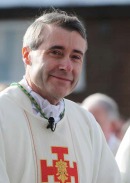Book Review: But is it true?
Article:
01.03.20
But is it true?
Why We Need Religion by Stephen T. Asma, Oxford University Press, 272 pp, £20
reviewed by Pravin Thevathasan
Contrary to secularist predictions, religion is still with us. Why is this? The author of this informative work is a professor of
philosophy and an agnostic. He argues very persuasively that we have an emotional need for religion. Science, he says, may lead us into a state of wonder. However, especially in times of crises, we need something more to fulfil us as human beings. Religion provides us with this.
A Darwinian defence
The author discusses the case of the mother who has had to come to terms with the tragic murder of her son. She grieves and she prays. She hopes that one day she will see her son again. She does not turn to science. Instead, her emotionally grounded beliefs give her the energy and vitality to continue to exist and care for her other children. The author can thus come up with a Darwinian defence of religious emotions and the cultural systems that manage them. Once we take the metaphysics out of the language of soul when, for example, a minister tells parents that the soul of their son is in a better place, then the objections of an agnostic will fall away: “Metaphysics aside, the minister’s language seems to suggest that there are emotions so deep and bonds so strong that not even death should end them. That is a beautiful sentiment no matter what you think of the soul.”
Morality, trauma and moods
The author also argues that religion plays a vital role in our moral behaviour. If you take religion seriously, you are more likely to be faithful to your spouse. You are more likely to be supportive of your children. You are more likely to forgive people, and psychology has demonstrated the vital importance of forgiveness in our emotional lives. Religion helps us live more self sacrificing lives, caring for others without expectation of anything in return.
The author cites evidence that religious people are better at rebounding from trauma. The religious life usually contains three elements in responding positively to adversity: a strong social support group, a focus on empathy and an ability to infer meaning.
What about meditation? The author examines the work of neuroscientist Dr Richard Davidson who has found that even limited meditation practices produce measurable changes in our neuroplastic system and our psychological mood. Spending ten minutes a day compiling a ‘gratitude list’ also generates beneficial brain changes. Repetition of these behaviours slowly creates stable personality traits.
Irrationality
The author has convincingly demonstrated his case that religion can be good for our emotional lives. It refreshes the parts of our nature that other disciplines cannot reach. But is it true? That, says the author, does not really matter. He states that he will not ‘spend much time trying to rescue religion as reasonable. It isn’t terribly reasonable. But therein lies its secret power. Contrary to the radical atheists, the irrationality of religion does not render it unacceptable or valueless.’ This is because the human brain consists of three major operating systems: the ancient reptilian brain which controls our fight or flight type of instincts, the mammalian brain which controls our emotions and the recent neocortex which controls our rationality. Religion nourishes our emotions even while it irritates our rationality.
The intellectual life, says the author, asks ‘Is this claim accurate?’ But the emotional life asks the more ancient question: Does this or that feeling help the organism thrive? So, for the author, religion is a mere feeling. It has nothing to do with truth. I beg to differ. There is overwhelming evidence from studies in mental health that religion can be good for us. The author’s view that none of it may be true is quite clearly a personal view, and he puts forward no reasonable argument for this, at least in this work.
Notes:
Dr Pravin Thevathasan is a consultant psychiatrist and author of the CTS booklet Catholicism and Mental Health.

